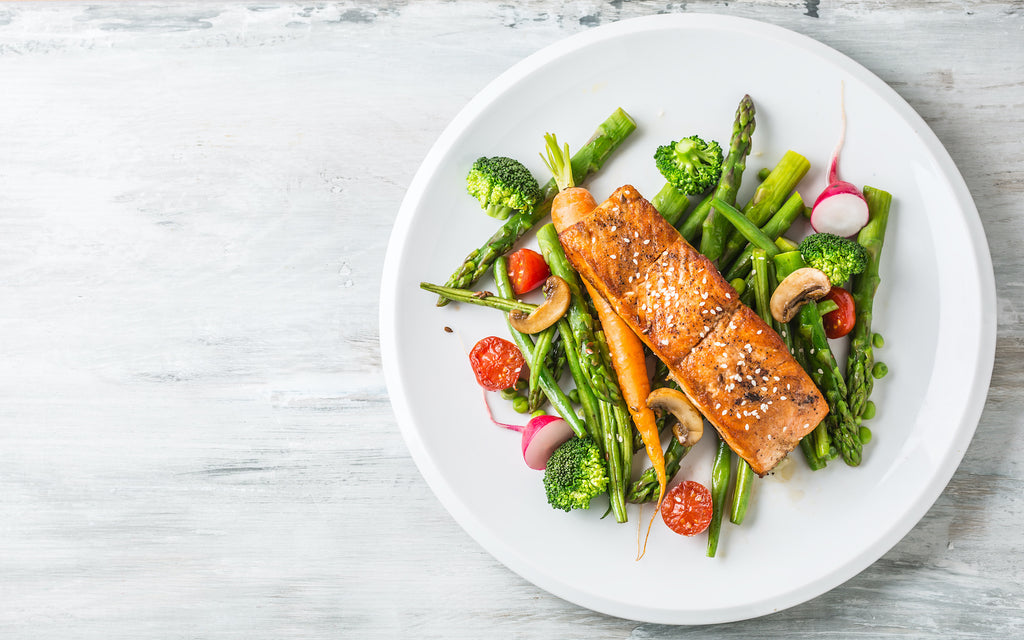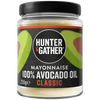Intermittent fasting is a way of eating that's sometimes paired with the ketogenic diet in order to boost metabolism and fat loss. Intermittent fasting (IF) can be done on a few different timetables, but the idea is to have a somewhat constricted eating window and then fast for the remainder of the time. The timetable can be within one day or even within one week, the most common being within each day.
But the definition of 'fasting' isn't always strictly 'zero intake'. Fasting doesn't have to mean total abstinence of all food and drink — although sometimes, it does. In fact, there are some things you can enjoy without breaking your fast, as long as you keep within a small caloric threshold.
If you're a novice biohacker and plan to give intermittent fasting a try, it's a good idea to know which foods and drinks are allowable during your fasting window because it will help make the fasting time a bit easier to get through. Having a plan is key for success. Arm yourself with accurate information on the benefits of intermittent fasting and the best and most effective ways to go about adapting to IF — especially if your goal is weight loss or fat loss.
Quick Review on Intermittent Fasting

There are a few ways you can successfully fast. It's important to note that you only get the fat loss and health benefits of an eating plan like this if the foods you're eating between fasts are healthy. Your goal is to consume real, whole foods that are nutrient-dense in order to maximise the fat-burning potential of these diets.
If you're overeating or chowing down on processed carbs and junk food during your eating periods and sending your blood sugar all over the place, you probably won't be super successful doing IF. You may also be a lot hungrier during your fasting periods. Here are the most common ways to execute this way of eating:
- The 16/8 Method: In this method, you have an 8-hour eating window every day, and then you fast for the remaining 16 hours (usually including the hours you're sleeping to make it easier).
- The 5:2 Method: This way of fasting involves choosing two days in the week for an extended fast of 24 hours while eating normally on the other five days. There are a couple of choices for your fasting days. You can either do a water fast, in which the only thing you consume on the two fasting days are water, black coffee and herbal tea, or you can restrict your calories on those days to no more than 25% of your normal caloric intake (and only eat certain healthy foods, which we'll cover shortly).
- Alternate Day Fasting: This method is a more intense version of the 5:2, in which you're fasting (either water fasting or with very restricted calories) every other day rather than just twice a week.
- The Warrior Diet: In this method, you're lightly grazing during the day on fruits and vegetables and then eating one large meal in the late afternoon or early evening. It's sort of like the 16/8 Method, but since the daytime food intake is so small, the windows are more like 12/12.
- Spontaneous Meal Skipping: In addition to these more regimented efforts geared toward performance and aggressive fat loss, you can also sporadically skip meals to fast or lose a few pounds over time. This is a less predictable way to go, but is still a version of IF that many people follow.
Benefits of Fasting and the Keto Diet

Fasting is a time-honoured practice, both for health reasons and for spiritual or religious reasons. Nearly every major religion has some sort of fasting ritual, either annually, weekly or something in between, in which it's part of worship to abstain from food for a certain period of time.
While IF doesn't promise a higher state of consciousness and spiritual bliss, you might find that you feel amazing in a fasted state. Similar to a keto diet, IF can increase ketone production and put you in a state of metabolic ketosis, even if temporarily, giving you all the health benefits of the keto diet. Therefore, fasting — especially when combined with keto — can do the following [1][2]:
- Improve focus and mental clarity
- Support gut health
- Increase stress resistance
- Create a temporary state of euphoria
- Aid in fat loss
- Improve cardiovascular biomarkers and insulin sensitivity
Fasting has also been shown to promote autophagy, which could increase longevity. Autophagy is kind of like a vacuuming up of the damaged cells in your body. In Latin, it means that your body is 'eating itself', making room for newer and healthier cells to grow in your body. While there's still a lot of work to be done in this area, there's promising research to suggest that autophagy could aid the body in fighting cancer progression [3].
Caveat for Women
Most clinical trials testing the effects of IF and the keto diet (including those we cited above) are done on men, leaving a relatively large gap in understanding around what happens to women on these diets beyond anecdotal observations.
A new study in 2019 comparing male and female mice actually showed that the ketogenic diet failed to improve insulin response in the female mice. In fact, many of the female mice gained weight and had higher levels of blood glucose than the male subjects at the conclusion of the experiment. The scientists involved in the study believe that fluctuating estrogen levels women could be the reason for the difference between sexes [4].
Of course, this isn't to say that women can't be successful on the keto diet or using IF, but the approach might vary from the standard approach designed for men. Read more about how these ways of eating can affect women differently from a hormonal expert, Natasha Turner.
What Can You Eat While Fasting?

No matter which type of IF you choose to follow, it's important to know what you can consume during the fasting window without ruining your efforts.
Zero Calories
The simplest way to think about very strict fasting is to focus on calorie-free options like water, green tea, herbal tea, black tea and black coffee. There's some evidence to suggest that black coffee changes your insulin levels, or at least temporarily reduces insulin sensitivity, but it also helps stave off hunger and has been shown to increase autophagy [5][6].
We advise that you stay away from artificial sweeteners like aspartame (including diet fizzy drinks) because of their potential effects on blood sugar. They also may increase sugar cravings, making it harder to stick to your plan.
Low-Carbohydrate, Nutrient-Dense Foods
Foods and drinks that have a high concentration of nutrition with very few calories and carbs work well for the plans in which you're allowed to eat up to 25% of your total calorie needs during the fasting periods.
Foods that fit the bill include:
- Eggs
- Lean meats
- Collagen-rich bone broth or collagen supplements (in small amounts)
- Cauliflower rice with steamed vegetables
- Low-calorie, low-carb soups
- Grilled or steamed fish
- Berries
- Water with lemon juice (no more than 3 ounces of lemon juice to avoid over-consuming fructose while fasting)
- Water with apple cider vinegar to promote digestion
What About Fatty Coffee?
Fatty coffee, also known as Bulletproof coffee or Evolve coffee, is a staple among keto dieters. Often including MCT oil, coconut oil, butter, double cream or some combination of these, fatty coffee is the breakfast of champions for certain fasters.
Because these fats and oils are high in calories, you might think that they would automatically break all fasting rules. But surprisingly, this might not be the case, especially for MCT oil. Made up of mostly caprylic acid, MCT oil doesn't cause an insulin spike, and it may even aid in ketone production, enhancing ketosis and keeping you fuller for longer. So for the sake of fasting, stick to adding small amounts of MCT oil into your coffee, and your afternoon will be smooth sailing.
As for the other ingredients, the jury is still out. Some sources suggest that small amounts (2 tablespoons, max) of butter or double cream won't break a fast, and may even enhance fat loss [7]. But others say that the calorie count is too high to keep the fast alive, even if ketosis is maintained [8].
So What Breaks a Fast?

The short answer to this question is 'everything else'. But when it comes to strategising the best possible way to break your fast, you want to stick to the tried and true rules of a keto lifestyle — with some slight modifications at first.
How careful you are when you break your fast is proportional to how long you've been fasting. We only covered IF in this post, but for longer, multi-day (or even week-long) fasts, you need to slowly incorporate foods to help get your digestive system back up and running gently.
Just make sure you're eating nutrient-dense, easy-to-digest foods like cooked leafy greens and crucifers, eggs, nuts, seeds and healthy fats like avocado and fatty fish. Once you confirm that you're able to digest these simpler foods, you can begin following your standard ketogenic guidelines until it's time to start your next fasting window.
Biohacking for Optimal Metabolism

Combining intermittent fasting with the ketogenic diet is one of the most popular ways to transform your metabolism and, ultimately, your physique. By ensuring that you know which foods are compatible with fasting and what breaks a fast, you'll be well on your way to reaching your fat loss, mental acuity and performance goals.
All information provided on our website and within our articles is simply information, opinion, anecdotal thoughts and experiences to provide you with the tools to thrive.
It is not intended to treat or diagnose symptoms and is definitely not intended to be misconstrued for medical advice. We always advise you seek the advice of a trained professional when implementing any changes to your lifestyle and dietary habits.
We do however recommend seeking the services of a trained professional who questions the conventional wisdom to enable you to become the best version of yourself.
REFERENCES:
[1] https://casereports.bmj.com/content/casereports/2018/bcr-2017-221854.full.pdf
[2] https://www.sciencedirect.com/science/article/pii/S1550413119304292?via%3Dihub
[3] https://www.ncbi.nlm.nih.gov/pmc/articles/PMC4388596/
[4] https://www.abstractsonline.com/pp8/#!/5752/presentation/16639
[5] https://pubmed.ncbi.nlm.nih.gov/28031026/
[6] https://ncbi.nlm.nih.gov/pmc/articles/PMC4111762
[7] https://www.ncbi.nlm.nih.gov/pmc/articles/PMC3607658/
[8] https://www.womenshealthmag.com/weight-loss/a28984183/intermittent-fasting-coffee/

















